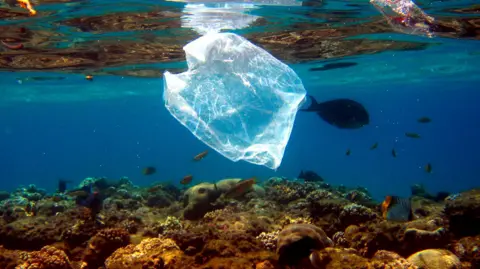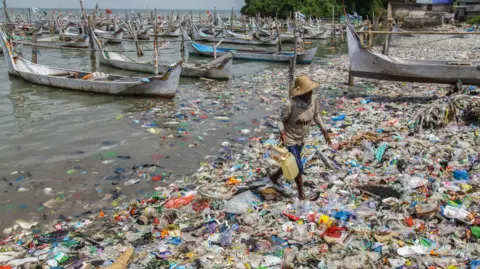Plastic bag bans and fees curb US shoreline litter, study suggests
 EPA
EPABanning or charging for plastic bags is helping stop them ending up on US shorelines, a study of the country's litter suggests.
Data from thousands of cleanups showed that areas which tried to reduce bag use saw them fall by at least 25% as a percentage of total litter collected, compared to areas that didn't try.
Bans or charging for bags worked better at state rather than town level, and had a bigger impact in places that had a bigger litter problem to begin with.
Despite the good news, the researchers cautioned that, overall, more plastic bags are being found across the US – they're just increasing less in those places trying to tackle the issue.
Plastic bag laws in the US vary considerably by state, county and town, which made it a useful place for researchers to test the effectiveness of bag policies.
Policies range from bans and partial bans (where only thinner bags are banned), to charges on bags and pre-emption laws, where states prevent counties and towns from regulating plastic bags themselves.
The researchers used data from shoreline cleanups that recorded bags as a percentage of all items collected, and looked at how this differed in areas with a policy compared to those without.
On average, bags made up 4.5% of items collected in cleanups, and were the fifth most common item found after cigarette butts, food wrappers, plastic bottle caps and plastic drinks bottles.
Different models were used to analyse the data, which estimated that the relative decrease in bags in areas with a policy was between 25% and 47%.
Comparing 182 policies and 45,067 cleanups from 2016 to 2023, the study's authors said it was the largest analysis of how effective such policies are in curbing shoreline litter.
 Getty Images
Getty ImagesPlastic bags 'only part of the problem'
The findings highlight the importance of policy in reducing plastic pollution, lead study author Anna Papp said.
One key policy opportunity would be the first global plastics treaty that 175 countries will continue negotiating in August, after talks collapsed in December.
"Stronger results in areas with a higher baseline of plastic bag litter means these policies may be especially effective in these areas," she said.
"It's also very important to keep in mind with the treaty, plastic bag policy addresses just one part of the problem.
"More comprehensive solutions are needed to address it entirely, with a focus on the production side, consumption, and waste," she said.
The research cautions that despite the evidence policies are working to reduce the relative percentage of plastic bags on shorelines, the overall percentage of bags is still increasing in places with and without policies.
This is because plastic pollution continues to grow overall, so policies can only make so much of a dent in the trend.
In the UK, where charges on single-use plastic bags started to be adopted in 2011, a survey found there had been an 80% fall in the number of bags washed up on beaches over a decade.

Sign up for our Future Earth newsletter to keep up with the latest climate and environment stories with the BBC's Justin Rowlatt. Outside the UK? Sign up to our international newsletter here.
